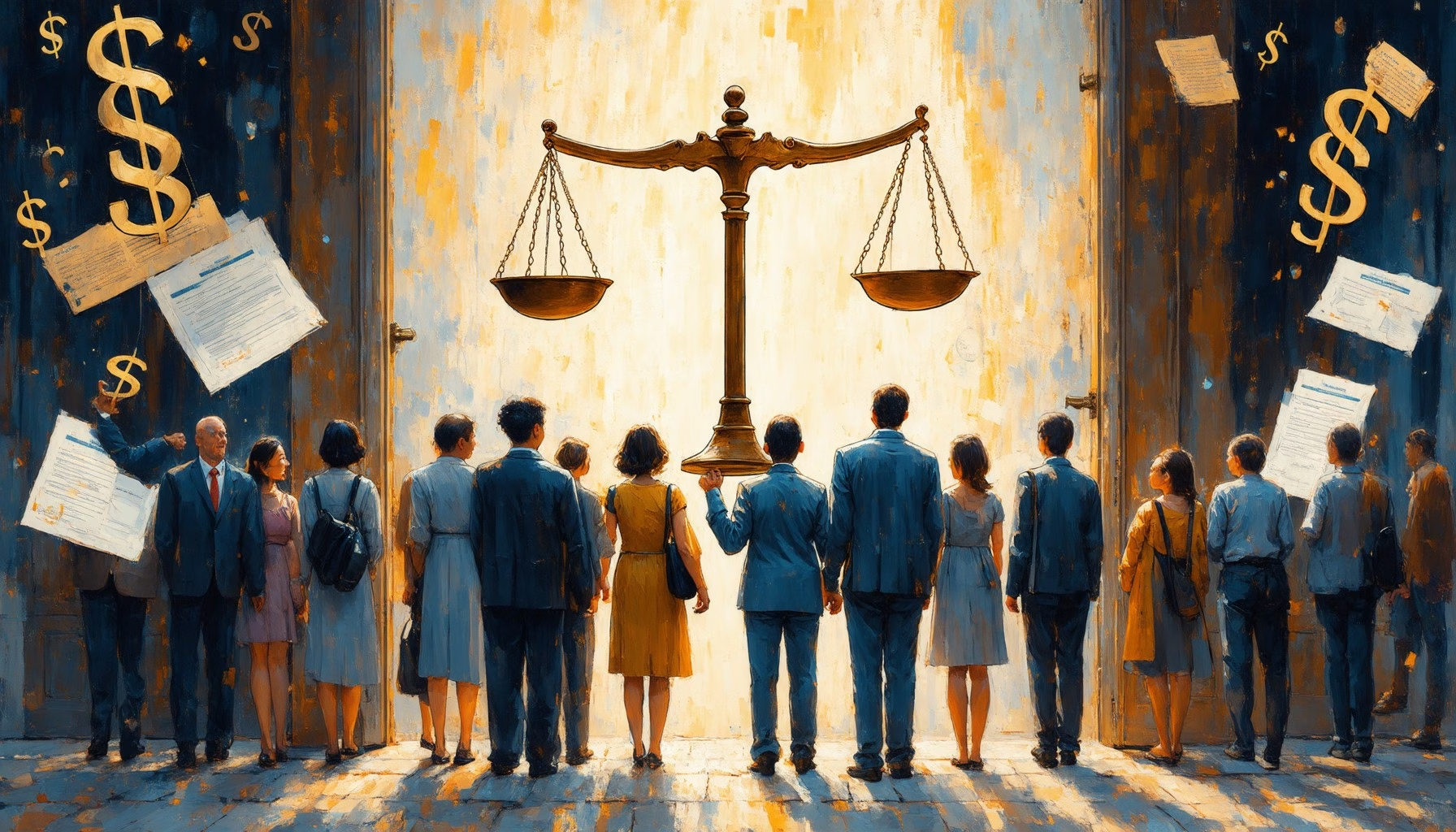Key Takeaways
- Understanding eligibility for free legal aid is crucial for low-income individuals seeking legal representation without financial burden.
- Income limits vary by state; in Colorado, individuals must meet specific income guidelines to access free legal services.
- Resources like Colorado Legal Services and local legal aid clinics offer essential assistance for various legal issues.
- Eligibility criteria include income thresholds, residency requirements, and the type of legal matter involved.
- Knowing who is not eligible for legal aid helps applicants avoid common pitfalls in the application process.
- For accurate and updated information, consult official legal aid resources and organizations.
Determining eligibility for free legal aid can be a crucial step for individuals seeking legal assistance without the burden of high costs. In this article, we will explore essential aspects such as the maximum income to qualify for legal aid, the requirements for legal aid, and how to access free lawyers in Colorado and beyond. We will also address common questions like who is not eligible for free legal aid and provide insights into the income limits that dictate eligibility. By understanding these factors, you can better navigate the legal landscape and determine if you qualify for the support you need. Join us as we delve into the details of how to be eligible for legal aid and uncover the resources available to low-income families seeking justice.
What is the maximum income to qualify for legal aid?
Understanding the maximum income to qualify for legal aid is crucial for individuals seeking legal assistance. Legal aid programs are designed to provide support to those who cannot afford legal representation, but eligibility often hinges on specific income limits that vary by state and individual circumstances. Knowing these limits can help you determine if you qualify for free legal aid and what resources are available to you.
Understanding Legal Aid Income Limits
The maximum income to qualify for legal aid varies significantly depending on the state and the specific legal aid program. For instance, in Alberta, individuals with a gross income of up to $30,000 may qualify for legal representation in eligible criminal, family, and immigration cases. However, it’s essential to recognize that legal aid programs consider various factors beyond just income, such as family size and specific legal needs.
For example, a single parent with a lower income may have different eligibility criteria compared to an individual without dependents. This nuanced approach ensures that those in the most need receive the support they require. To find the most accurate and up-to-date information regarding income limits and eligibility, individuals should refer to the official Legal Aid Alberta website or consult with a legal professional. Additionally, resources like the Government of Alberta’s legal aid guidelines can provide detailed insights into eligibility requirements and application processes.
For further assistance, you can explore the Gov Guider platform, which offers guidance on accessing legal resources and understanding the legal aid system in Alberta.
Who is Not Eligible for Free Legal Aid?
Understanding who is not eligible for free legal aid is just as important as knowing the income limits. Generally, individuals may be disqualified from receiving legal aid for several reasons, including:
- Having an income above the established legal aid limits.
- Possessing significant assets that exceed the allowable thresholds.
- Being involved in legal matters that are not covered by legal aid programs, such as certain civil disputes.
- Failing to meet residency requirements, as some programs are limited to residents of specific states or regions.
It’s essential to review the specific requirements for legal aid in your area to determine your eligibility. For a comprehensive overview of who is eligible for legal aid, you can visit the Legal Services Corporation website, which provides valuable resources and information on legal aid services across the United States.

Can I get a free lawyer in Colorado?
Yes, you can get a free lawyer in Colorado through several resources designed to assist low-income individuals and seniors. Here are some key options:
- Colorado Legal Services (CLS): CLS is a non-profit organization that offers free civil legal assistance to eligible low-income residents and seniors in Colorado. They provide a range of services, including help with housing, family law, and public benefits. To qualify, applicants must meet specific income guidelines. More information can be found on their website at www.coloradolegalservices.org.
- Colorado Bar Association’s Lawyer Referral Service: While not entirely free, this service can connect you with attorneys who may offer a free initial consultation. This can be a valuable first step in understanding your legal options.
- Legal Aid Clinics: Various legal aid clinics operate throughout Colorado, often affiliated with law schools or community organizations. These clinics provide free legal advice and assistance on specific legal issues. Check local listings or contact nearby law schools for available clinics.
- Pro Bono Programs: Many law firms and individual attorneys in Colorado participate in pro bono work, offering their services for free to those in need. The Colorado Bar Association can provide information on pro bono opportunities in your area.
- Gov Guider: This resource can help you navigate legal services available in Colorado, including finding free or low-cost legal assistance. It provides information on various legal topics and can direct you to appropriate services based on your needs.
Accessing Free Legal Aid Near Me
Finding free legal aid nearby is essential for those who qualify. Here are steps to locate legal assistance:
- Search Online Directories: Websites like the Legal Services Corporation provide directories of legal aid organizations by state, making it easier to find local resources.
- Contact Local Law Schools: Many law schools have legal clinics where students provide free legal services under the supervision of licensed attorneys. This can be a great way to receive assistance while also helping students gain practical experience.
- Utilize Community Resources: Local community centers or non-profits often have information on legal aid services available in your area. They can guide you to the right organizations based on your specific needs.
Requirements for Legal Aid in Colorado
To qualify for legal aid in Colorado, applicants typically need to meet specific requirements:
- Income Limit for Legal Aid: Most legal aid organizations have income limits based on the federal poverty guidelines. Generally, individuals and families earning below a certain percentage of the poverty line may qualify for assistance.
- Type of Legal Issue: Legal aid services often focus on specific areas of law, such as family law, housing, or public benefits. Ensure your legal issue falls within the scope of services offered by the organization you contact.
- Residency Requirements: Applicants usually need to be residents of Colorado or the specific area served by the legal aid organization.
Is Legal Aid of WV Free?
Legal Aid of West Virginia (Legal Aid WV) provides free legal services to eligible individuals across the state. As a nonprofit organization, it aims to ensure that all West Virginians have access to justice, regardless of their financial situation. Legal Aid WV offers assistance in various areas, including family law, housing issues, consumer protection, and public benefits. Understanding the eligibility for free legal aid is crucial for those seeking assistance.
Legal Aid Examples in West Virginia
Legal Aid WV serves a diverse range of legal needs. Some examples of the services provided include:
- Family law assistance, such as divorce and custody disputes.
- Housing issues, including eviction defense and landlord-tenant disputes.
- Consumer protection, helping individuals with debt collection and fraud cases.
- Public benefits, including assistance with food stamps and disability claims.
To determine if you qualify for free legal aid, you can apply online or contact your local office for guidance. It’s essential to understand the income limit for legal aid and other eligibility criteria to ensure you receive the support you need.
Who is Eligible for Legal Aid in WV?
Eligibility for legal aid in West Virginia is primarily based on income and specific legal needs. Generally, individuals who fall below a certain income threshold may qualify for free legal services. The American Bar Association provides resources to help individuals understand who is eligible for legal aid. Additionally, those who are not eligible for free legal aid typically include:
- Individuals with incomes above the established limits.
- Those seeking legal assistance for issues outside the scope of services offered by Legal Aid WV.
- Individuals who have access to other forms of legal representation.
For more detailed information about their services and eligibility criteria, you can visit the Nolo legal resources for guidance on how to qualify for free legal aid.
Is Everyone Entitled to a Free Lawyer?
The right to a free lawyer is primarily guaranteed under the Sixth Amendment of the United States Constitution, which ensures that individuals charged with a crime have the right to legal counsel. This entitlement applies specifically to those facing criminal charges that could result in imprisonment and who cannot afford to hire a private attorney. Understanding who is eligible for free legal aid is crucial for those in need of legal representation.
Who is Eligible for Free Legal Aid?
Eligibility for free legal representation typically includes:
- Individuals charged with felonies or misdemeanors that carry potential jail time are eligible for a public defender.
- Eligibility may vary by state, but generally, a financial assessment is conducted to determine if a defendant qualifies for free legal services.
It’s important to note that not all legal issues qualify for free representation. For instance, civil cases, such as family law or housing disputes, usually do not fall under this entitlement. However, some states have programs that offer limited legal assistance for civil matters, though these are not universally available.
How to Qualify for Free Legal Aid
To qualify for free legal aid, individuals must follow specific steps:
- Request a public defender at the first court appearance or arraignment. Defendants should clearly state their financial inability to afford a lawyer.
- Courts typically provide forms to assess financial eligibility for public defense services.
Additionally, organizations such as the American Bar Association and local legal aid societies provide resources and information about obtaining free or low-cost legal assistance. The Legal Services Corporation is another valuable resource, supporting civil legal aid for low-income individuals.

How much does a legal aid lawyer cost?
Legal aid lawyers typically provide their services at no cost to individuals who meet specific income eligibility criteria. These not-for-profit organizations aim to assist those who cannot afford private legal representation. While many legal aid offices focus on clients with very low incomes, some may have more flexible income guidelines, allowing a broader range of individuals to access their services.
Understanding Legal Aid Costs
When considering the costs associated with legal aid, it’s important to understand that the primary goal of these organizations is to ensure access to justice for low-income individuals. Most legal aid services are free, but there may be some exceptions based on the type of case or additional services required. For example, while initial consultations and basic legal assistance are often provided at no charge, certain specialized services might incur fees.
Additionally, many legal aid offices offer self-help resources, including legal information and guidance on various legal issues, which can empower individuals to navigate their legal challenges more effectively. For those who do not qualify for legal aid, alternative low-cost legal services may be available through local bar associations or legal clinics, which often provide reduced-fee consultations or pro bono services.
What Does Legal Aid Help With?
Legal aid organizations assist with a variety of legal issues, primarily focusing on civil matters. Common areas of assistance include:
- Housing disputes, such as eviction or foreclosure
- Family law issues, including divorce and child custody
- Consumer protection, including debt collection and bankruptcy
- Employment-related matters, such as wrongful termination
- Public benefits, including food stamps and disability claims
It is essential to check with your local legal aid office for specific eligibility requirements and available services. Resources such as LawHelp.org can help you locate legal aid offices in your area, ensuring you receive the necessary support tailored to your situation. For more detailed information on legal aid services and eligibility, you can refer to the Legal Services Corporation website, which provides comprehensive resources and links to local legal aid organizations across the United States.
What is the maximum salary for legal aid?
The maximum salary for legal aid eligibility is determined by means testing, which assesses your gross monthly income. As of the latest guidelines, your gross monthly income should be £2,657 or less to qualify for civil legal aid. If you have more than four child dependants, you can add £222 for the fifth child and each additional child thereafter. It’s important to note that these figures can vary based on specific circumstances and the type of legal aid being sought. For the most accurate and up-to-date information, refer to the official government resources such as the GOV.UK website, which provides comprehensive details on eligibility criteria and the application process for legal aid.
Income Limit for Legal Aid Explained
The income limit for legal aid is a critical factor in determining who is eligible for free legal aid. Generally, if your income exceeds the specified threshold, you may not qualify for assistance. This limit is designed to ensure that legal aid is directed towards those who genuinely need financial support. Additionally, other factors such as savings and assets may also influence your eligibility. Understanding these criteria can help you assess your situation accurately and determine if you meet the requirements for legal aid.
Do I Qualify for Legal Aid Based on Income?
To determine if you qualify for legal aid based on income, you need to evaluate your gross monthly earnings against the established income limits. If your income is below the threshold, you may be eligible for assistance. However, it’s essential to consider other factors, such as your household size and any dependants. If you are unsure about your eligibility, you can consult resources like the Legal Services Corporation or the American Bar Association for guidance on how to qualify for free legal aid and to explore options available to you. Additionally, reviewing the Nolo legal resources can provide further insights into the legal aid process.
How to be eligible for legal aid?
Determining your eligibility for legal aid is crucial for accessing free or low-cost legal services. The process typically involves assessing your income, the type of legal issue you are facing, and your residency status. Here’s a detailed guide on how to be eligible for legal aid.
Steps to Determine if You Qualify for Legal Aid
- Assess Your Income: The first step is to evaluate your household income against the income limit for legal aid. Each state has different thresholds, often based on the federal poverty level. Generally, if your income is at or below 125% of the federal poverty line, you may qualify.
- Identify Your Legal Issue: Legal aid services typically cover specific areas such as family law, housing disputes, and public benefits. Ensure that your legal issue falls within the scope of services provided by legal aid organizations.
- Check Residency Requirements: Most legal aid programs require applicants to be residents of the state in which they are applying. Verify that you meet this criterion.
- Gather Necessary Documentation: Prepare documents that verify your income, residency, and the nature of your legal issue. This may include pay stubs, tax returns, and identification.
- Contact a Legal Aid Organization: Reach out to a local legal aid office to discuss your situation. They can provide guidance on the application process and help you understand your rights and options for legal aid.
Legal Aid Eligibility Requirements in New York
In New York, eligibility for legal aid is determined by several factors:
- Income Limits: To qualify for free legal aid, your income must be below a certain threshold, which is generally set at 200% of the federal poverty level. For example, in 2025, a single individual must earn less than approximately $27,180 annually.
- Type of Legal Matter: Legal aid in New York is available for various issues, including family law, housing, and immigration. However, not all legal matters are covered, so it’s essential to confirm that your case qualifies.
- Asset Limits: Some legal aid programs also consider your assets. If you have significant savings or property, this may affect your eligibility.
- Special Circumstances: Certain groups, such as veterans or individuals facing domestic violence, may have additional resources available to them.
For more information on legal aid services in New York, you can visit the American Bar Association for resources and guidance.




